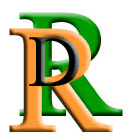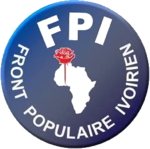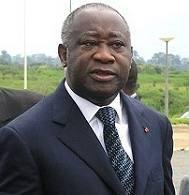Aimé Henri Konan Bédié is an Ivorian politician. He was President of Côte d'Ivoire from 1993 to 1999, and he is currently the President of the Democratic Party of Côte d'Ivoire - African Democratic Rally (PDCI-RDA).

The Rally of the Republicans is a liberal party in Ivory Coast. The party is the country's governing party; the party's leader, Alassane Ouattara, is the current President of Ivory Coast.

The First Ivorian Civil War was a conflict in the Ivory Coast that began in 2002. Although most of the fighting ended by late 2004, the country remained split in two, with a rebel-held Muslim north and a government-held Christian south. Hostility increased and raids on foreign troops and civilians rose. As of 2006, the region was tense, and many said the UN and the French military failed to calm the civil war.

Alassane Dramane Ouattara is an Ivorian politician who has been President of Ivory Coast since 2010. An economist by profession, Ouattara worked for the International Monetary Fund (IMF) and the Central Bank of West African States, and he was the Prime Minister of Côte d'Ivoire from November 1990 to December 1993, appointed to that post by President Félix Houphouët-Boigny. Ouattara became the President of the Rally of the Republicans (RDR), an Ivorian political party, in 1999.

The Ivorian Popular Front is a centre-left, democratic socialist and social democratic political party in Ivory Coast.
Ibrahim Coulibaly was a military and rebel leader in Côte d'Ivoire. A Staff Sergeant in the Armed Forces of Côte d'Ivoire, Coulibaly had served since at least the early 1990s. As Côte d'Ivoire slid into communal conflict, Coulibaly joined the 1999 coup led by Robert Guéï. A second coup, following 2000 elections that made Laurent Gbagbo President, saw Coulibaly in a leadership position, after which he came into conflict with fellow military leader Guillaume Soro. During the ensuing eight years of division in the country, Coulibaly came into conflict with both sides, eventually returning to lead an Abidjan-based militia supportive of Alassane Ouattara. Following the end of fighting, Coulibaly was killed in Abidjan by Ouattara's forces during an attempt to disarm his group. Known popularly as "IB", he was 47 years old at the time of his death.

The United Nations Operation in Côte d'Ivoire(UNOCI)(French: Opération des Nations Unies en Côte d'Ivoire, ONUCI) was a peacekeeping mission whose objective was "to facilitate the implementation by the Ivorian parties of the peace agreement signed by them in January 2003". The two main Ivorian parties here are the Ivorian Government forces who control the south of the country, and the New Forces, who control the north. The UNOCI mission aims to control a "zone of confidence" across the centre of the country separating the two parties. The Head of Mission and Special Representative of the Secretary-General is Aïchatou Mindaoudou Souleymane from Niger. She has succeeded Bert Koenders from the Netherlands in 2013 who himself succeeded Choi Young-jin from South Korea in 2011. The mission officially ended on 30 June 2017.
Opération Licorne was the name of the French Armed Forces's peacekeeping operation in support of the United Nations Operation in Côte d'Ivoire. The French forces have been stationed in the country since shortly after the outbreak of the Ivorian Civil War. The troops' main mission was to support the United Nations peacekeeping mission and to ensure the security of French and foreign nationals.

Presidential elections were held in Ivory Coast in 2010. The first round was held on 31 October, and a second round, in which President Laurent Gbagbo faced opposition leader Alassane Ouattara, was held on 28 November 2010. Originally scheduled to be held in 2005, the vote was delayed several times due to the Ivorian Civil War and difficulties involved in the organization and preparation of the elections. A peace agreement between the government and the former rebel New Forces was signed on 4 March 2007, and in late April 2009, it was announced that the elections would be held by 6 December 2009, and that the date would be announced shortly. On 15 May 2009, the date was announced to be 29 November 2009. On 11 November, the elections were postponed again due to delays in the electoral roll. It was announced on 3 December 2009 to be held in late February or early March 2010.

A parliamentary election was held in Ivory Coast on 11 December 2011, after the presidential election which was held in late 2010. This followed a peace agreement between the government and the New Forces that was signed in March 2007. The Rally of the Republicans, the party of President Alassane Ouattara, won just under half the seats in the National Assembly.

The 2010–11 Ivorian crisis was a political crisis in Ivory Coast which began after Laurent Gbagbo, the President of Ivory Coast since 2000, was proclaimed the winner of the Ivorian election of 2010, the first election in the country in 10 years. The opposition candidate, Alassane Ouattara, and a number of countries, organisations and leaders worldwide claimed Ouattara had won the election. After months of attempted negotiation and sporadic violence, the crisis entered a decisive stage as Ouattara's forces began a military offensive in which they quickly gained control of most of the country and besieged key targets in Abidjan, the country's largest city. International organizations have reported numerous human rights violations, and the UN undertook its own military action with the stated objective to protect itself and civilians.

The Second Ivorian Civil War broke out in March 2011 when the crisis in Ivory Coast escalated into full-scale military conflict between forces loyal to Laurent Gbagbo, the President of Ivory Coast since 2000, and supporters of the internationally recognised president-elect Alassane Ouattara. After months of unsuccessful negotiations and sporadic violence between supporters of the two sides, the crisis entered a critical stage as Ouattara's forces seized control of most of the country with the help of the UNO, with Gbagbo entrenched in Abidjan, the country's largest city. International organizations have reported numerous instances of human rights violations by both sides, in particular in the city of Duékoué where Ouattara's forces killed hundreds of people. Overall casualties of the war are estimated around 3000. The UN and French forces took military action, with the stated objective to protect their forces and civilians. France's forces arrested Gbagbo at his residence on 11 April 2011.

United Nations Security Council Resolution 1975, adopted unanimously on March 30, 2011, after recalling previous resolutions on the situation in Côte d'Ivoire, including resolutions 1572 (2004), 1893 (2009), 1911 (2010), 1924 (2010), 1933 (2010), 1942 (2010), 1946 (2010), 1951 (2010), 1962 (2010), 1967 (2011) and 1968 (2011), the Council demanded that Laurent Gbagbo step down as President and imposed sanctions on him and his close associates.
The following lists events that happened during 2006 in Ivory Coast.
The following lists events that happened during 2010 in Ivory Coast.
The following lists events that happened during 2011 in Ivory Coast.
Anne Jacqueline Oble also known as Jacqueline Lohoues-Oble is an Ivorian lawyer and politician who was the first woman to stand as a candidate in a presidential election.












